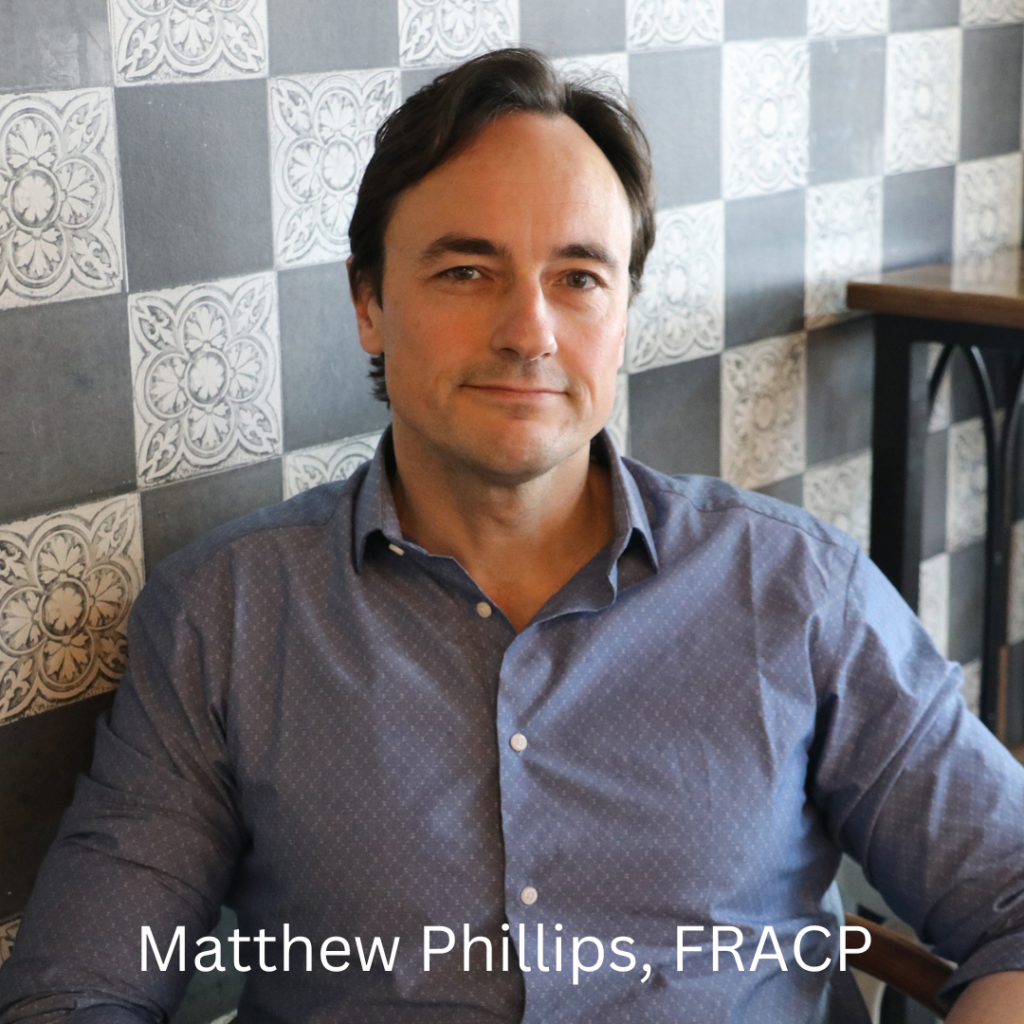Neurologist set to speak about metabolic therapies at 8th Annual San Diego Symposium for Metabolic Health, August 17-20
The 8th Annual Symposium for Metabolic Health, hosted by LowCarbUSA® in San Diego, August 17-20, 2023, will feature a special session dedicated to exploring the connection between cancer and metabolic disease. The session will focus on metabolic therapies in cancer treatments and their potential to improve outcomes and reduce side effects.
We recently had the chance to speak to Dr. Matthew Phillips, FRACP, who is set to deliver a powerful presentation titled “Cancer In Evolution” where he will discuss the role of metabolic therapy in cancer treatment.

Dr. Phillips is a clinical and research neurologist based in Waikato Hospital, Hamilton, New Zealand. His primary focus is on exploring the potential of metabolic strategies, such as fasting and ketogenic diets, to create alternate metabolic states that could improve the health of people with cancer and various neurological disorders. His research team has conducted the world’s first randomized studies on individuals diagnosed with Parkinson’s and Alzheimer’s, and is now pioneering a clinical trial combining intensive fasting and a ketogenic diet with standard treatments in patients with glioblastoma multiforme.
Metabolic Therapy: The How, Why, and The Evidence
During our recent interview, Dr. Phillips shed light on his upcoming presentation. He revealed that the talk would revolve around three main topics: understanding how metabolic therapy works, exploring why it works from an evolutionary context, and assessing the evidence that supports its use.
Critically, Dr. Phillips emphasized the importance of presenting evidence from human studies. Despite the compelling theoretical foundations of metabolic therapy in cancer treatment, he noted a lack of concrete evidence to firmly establish its effectiveness. He intends to discuss his team’s work on metabolic therapies and cancer, examining both their strengths and areas for improvement, to underscore the need for more robust evidence.
The Challenge of Embracing Metabolic Therapies
Despite significant theoretical advancements over the past 10-20 years, the medical field has yet to fully embrace metabolic therapies, especially in the treatment of advanced cancers. Dr. Phillips stressed the urgent need for well-designed clinical trials with sufficient patient numbers to validate the effectiveness of these therapies.
In his talk, he will discuss in detail the metabolic therapy programs used in his current clinical trial involving patients with glioblastoma multiforme. This program, considered by Dr. Phillips, to be the most intensive metabolic therapy ever applied to a group of patients, is poised to provide valuable insights into this innovative approach to cancer treatment.
A New Perspective: Mitochondria as the Essence of Life
One significant challenge that Dr. Phillips identified is the shift in perspective required to understand the potential therapeutic power of metabolic therapies. He advocates for an evolutionary approach to understanding cancer and neurodegenerative disorders, placing the emphasis not on the cells, but on the mitochondria.
For decades, medical and scientific systems have taught us that cells are the building blocks of life. Dr. Phillips proposes a radical rethinking of this concept, arguing that mitochondria, not cells, are the fundamental essence of complex life.
In an era where genetics has been the primary focus, he believes that metabolic therapy, which prioritizes mitochondrial health, could offer a more effective solution. “If you have good mitochondria and cell health, you’re going to have good health. That’s the definition of health,” he stated.
A Long Road Ahead
According to Dr. Phillips, the shift towards metabolic therapy is still in its early stages. For years, the fascination with genetics dominated the medical and scientific fields. Now, however, the limitations of a purely genetic perspective are becoming more apparent, sparking a renewed interest in metabolism and mitochondrial function.
Dr. Phillips says he will continue to advocate for this shift and inspire others in the field to join him in his pioneering work on metabolic therapy for cancer treatment. By doing so, he hopes to instigate a revolution in our approach to health, enhancing our understanding of disease and refining our strategies for tackling some of today’s most pressing health challenges.
Tackling Neurological Disorders
Another crucial part of Dr. Phillips’s research involves addressing neurological disorders like Alzheimer’s and Parkinson’s diseases. Dr Phillips says he believes these diseases are fundamentally linked to metabolic dysfunction, making a metabolic therapeutic approach potentially beneficial. “These conditions are not separate entities,” Dr. Phillips explained, “They’re linked by shared metabolic dysfunction. Addressing the metabolic health of patients can have a profound effect on their neurological health.”
Dr. Phillips’s work underscores the connection between metabolic health and neuronal function. “Neurons are energy-demanding cells,” he said. “If the metabolic health is compromised, neuronal function is directly affected. Improving metabolic health can lead to significant improvements in neuronal health and, consequently, overall neurological function.”
The Human Element: Diet and Compliance
Implementing a stringent diet, which is central to metabolic therapy, can prove challenging for many patients, according to Dr. Phillips. “Changing one’s diet isn’t easy. It’s a lifestyle change, and that requires a commitment from the patient,” he said, pointing out that even those not facing a serious condition or disease can derive benefits.
Dr. Phillips emphasized that the first step to embracing metabolic therapy is to introduce an intermittent fasting protocol. “Start with something easy, like a 12-hour fast every day. Get that down, so that you not only can do it, but that you enjoy it and you look forward to it and you recognize that it actually improves your life.”
He notes the universal accessibility of fasting. “No matter how busy you are, no matter how poor your socioeconomic status, no matter how stressed you are, everyone can fast. It makes life easier and better.”
Once the fasting protocol is established, the next step is to work on the diet. For those not being treated for a specific disease, Dr. Phillips is not dogmatic about diet but does advocate for reducing processed carbohydrates and favoring a low-carb approach. He acknowledges that there’s room for flexibility within dietary parameters. “I’m not a Keto zealot, but I think there are strong arguments for humans to be in physiological ketosis most of the time – and the introduction of an intermittent fasting protocol is the key starting point.”
While embracing this new lifestyle, occasional lapses, or “cheating,” can occur. He considers these to be part of the human experience. The key, he emphasized, is getting back on track and demonstrating a commitment to health.
Monitoring Progress: The Importance of Measuring Ketones
For patients who choose to follow metabolic therapy through a ketogenic diet, monitoring progress is vital. Dr. Phillips advocates for measuring ketones and glucose levels daily during the initial phase of therapy. “That’s 100 percent necessary,” he said, “Every day, at the same time a day.”
“Most people who are on a ketogenic diet, unfortunately, are not in ketosis. When I get people to measure, if they say they’re keto, it’s the rare exception where a person’s ketones are actually in any decent level of physiological ketosis.” Dr. Phillips explained. He added that a moderate level of ketosis is anything over one millimole per liter, with anything over two considered very good.
Dr. Phillips’ nuanced approach to diet, fasting, and ketone monitoring underscores his commitment to finding a flexible, personalized, and evidence-based approach to metabolic therapy. This tailored approach could potentially aid many patients struggling with neurodegenerative disorders and cancer, helping them regain control over their health.
Why Attend the Symposium?
Dr. Phillips discussed the transformative potential of the Metabolic Health Symposium, explaining that the value in attending extends far beyond simply gaining knowledge. He believes the Symposium is a unique opportunity for attendees to not only learn from some of the most distinguished figures in metabolic health but also actively participate in shaping the discourse.
“It’s not just about listening to presentations; it’s about engaging in critical discussions, questioning old paradigms, and being part of the shift towards more comprehensive health strategies,” he explained.
Dr. Phillips voiced his frustration with the current medical paradigm, highlighting a significant gap in our healthcare system. “In my daily work as a neurologist, I see that what we do in the medical system is mainly about masking symptoms and attacking disease processes. It’s a very superficial way of looking at things if you limit yourself to that.”
As an advocate for a shift in approach, Dr. Phillips champions the idea of restoring health rather than just treating disease. He stressed, “The real game should be restoring health using metabolic therapies. These conferences allow us to really focus on that aspect, something most clinicians I interact with don’t get taught much about and therefore don’t fully appreciate.”
The shift Dr. Phillips envisions is one where healthcare professionals are not just dealing with the aftermath of diseases but are actively working on restoring health. He concluded with an impactful remark:
“We could do so much more good for people, if we had a wider awareness of this. Unfortunately, a lot of patients currently know more about this stuff than the treating clinicians.” This candid statement highlights the urgent need for events like the Symposium, where attendees have the chance to go deeper into metabolic health and its role in overall wellness.
8th Annual SMH – San Diego, August 17-20, 2023
Attendees of this year’s Symposium for Metabolic Health in San Diego will have the opportunity to learn science-based information about the use of carbohydrate reduction as a powerful tool in addressing and even reversing various health conditions. The conference will showcase how therapeutic carbohydrate restriction can positively impact type 2 diabetes, hypertension, fatty liver, PCOS, cardiovascular disease, neurological pathologies such as epilepsy and traumatic brain injuries, Alzheimer’s, mental health conditions, and much more.
As discussed above, this year’s event features a special session dedicated to exploring the intricate connection between cancer and metabolic disease. Experts will educate practitioners and laypersons alike on metabolic therapies that may complement traditional treatments, potentially improving outcomes while minimizing side effects.
For individuals interested in exploring the extensive evidence supporting carbohydrate reduction as a therapeutic intervention and discovering ways to enhance their metabolic health through lifestyle changes, the Symposium for Metabolic Health in San Diego is set to take place from August 17 to August 20, 2023.
Even if you can’t attend in person, signing up for the livestream is highly encouraged. The virtual platform offers an excellent opportunity to connect with like-minded individuals through the chat application and access inspiring and informative lectures from the comfort of your home or office.
One of the incredible benefits of registering for the symposium, whether in person or via livestream, is the unlimited access to replays. So, in case you miss any part of the live sessions, you will have the flexibility to watch and review the content at your convenience.
As an added benefit, there’s a discount code available on the registration page, offering savings on tickets, low-carb meals, and optional CME credits.
Don’t miss this chance to join the global community of health professionals and individuals dedicated to improving metabolic health and advocating for evidence-based approaches. Learn more and secure your spot at the 8th Annual Symposium for Metabolic Health in San Diego today.


